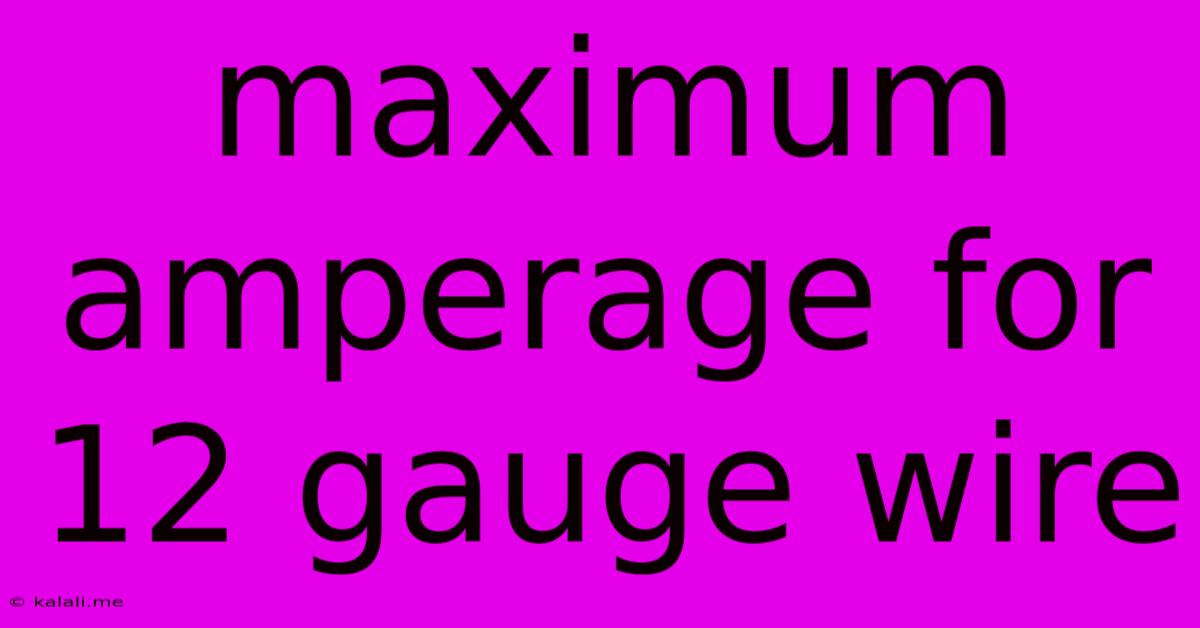Maximum Amperage For 12 Gauge Wire
Kalali
Jun 05, 2025 · 3 min read

Table of Contents
Maximum Amperage for 12 Gauge Wire: A Comprehensive Guide
Determining the maximum amperage for 12 gauge wire is crucial for electrical safety and preventing fire hazards. This guide will delve into the specifics, exploring factors that influence amperage capacity and providing you with the information you need to make informed decisions about your wiring projects. Understanding this is essential for any DIY electrical work, ensuring your home's electrical system is safe and compliant with building codes.
What is Amperage and Why is it Important?
Amperage, or current, measures the rate of electrical flow. Too much current flowing through a wire can cause it to overheat, potentially leading to melting insulation, sparking, and even fires. Therefore, choosing the correct gauge wire with sufficient amperage capacity is paramount. A wire's gauge refers to its diameter – smaller gauge numbers indicate thicker wires, capable of carrying more current.
Maximum Amperage for 12 Gauge Wire: The Basics
The generally accepted maximum amperage for 12 gauge copper wire in standard residential wiring is 20 amps. This is based on the National Electrical Code (NEC), a widely adopted standard in North America. However, it's crucial to remember that this is a general guideline and several factors can influence the actual safe amperage limit.
Factors Affecting 12 Gauge Wire Amperage:
Several factors beyond the wire's gauge influence its safe amperage capacity. These include:
- Installation Method: Wiring installed in conduit (metal or plastic pipes) or within walls will experience different levels of heat dissipation compared to open-air wiring. Conduit installation reduces heat dissipation, potentially lowering the safe amperage limit.
- Ambient Temperature: Higher ambient temperatures surrounding the wire can further reduce its current-carrying capacity. Heat buildup is a significant concern, and ambient heat exacerbates the problem.
- Number of Conductors in a Conduit: If multiple wires are bundled together within a conduit, the heat generated by each wire will influence the overall temperature of the conduit, further lowering the safe amperage for each individual wire.
- Wire Material: While most residential wiring uses copper, aluminum wiring was once common. Aluminum wire has a higher resistance than copper and consequently a lower amperage capacity for the same gauge. Always check your specific wire type.
- Length of the Wire Run: Longer wire runs will experience increased voltage drop, potentially causing overheating at the end of the circuit.
NEC and Local Codes: Always Check Your Regulations
It's imperative to consult the NEC and your local building codes. These regulations often provide more specific guidance on amperage limits based on local conditions and installation practices. Ignoring these regulations can lead to serious safety hazards and potential legal issues. Local electrical inspectors will always assess your wiring against these codes.
Choosing the Right Breaker:
The circuit breaker protects the wiring from overloads. A circuit breaker rated for 20 amps should be used with 12 gauge copper wire in typical residential applications. The breaker will trip and cut off power if the current exceeds its rating, preventing overheating and potential hazards. Using a breaker with a higher amperage rating than recommended is extremely dangerous and compromises the safety of your wiring and electrical system.
Understanding the Implications:
Using a wire with insufficient amperage capacity for the intended load can lead to several problems:
- Overheating: The most immediate danger, potentially leading to fires.
- Circuit Breaker Tripping: Frequent tripping indicates an overloaded circuit.
- Voltage Drop: This reduces the efficiency of the circuit and may cause connected appliances to malfunction.
Conclusion:
While the general maximum amperage for 12 gauge copper wire is 20 amps, this is a guideline. Always consider the factors mentioned above and adhere to local building codes and the NEC. Ensuring proper electrical installation and using the correct amperage rating are paramount for a safe and efficient electrical system. Remember, if you’re unsure about any aspect of electrical work, consulting a qualified electrician is always the safest approach.
Latest Posts
Latest Posts
-
Hooking Up A Dishwasher To Garbage Disposal
Jun 07, 2025
-
Easy Preprints To Submit Energy Papesr To
Jun 07, 2025
-
Can You Put An Anchor In A Stud
Jun 07, 2025
-
How To Tell If A Number Is Divisible By 4
Jun 07, 2025
-
How Tall Should Dining Room Table Legs Be
Jun 07, 2025
Related Post
Thank you for visiting our website which covers about Maximum Amperage For 12 Gauge Wire . We hope the information provided has been useful to you. Feel free to contact us if you have any questions or need further assistance. See you next time and don't miss to bookmark.